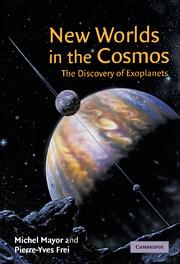Book contents
- Frontmatter
- Contents
- List of figures
- Preface
- Acknowledgements
- 1 The quest begins
- 2 Infinity and beyond
- 3 New arrivals in the Solar System
- 4 Why stars wobble
- 5 Neutron planets
- 6 Brown dwarfs in the headlines
- 7 Sirens in the Cosmos
- 8 Foreign planets different to our home-grown ones
- 9 Destination: earths!
- 10 Further yet: life
- Appendix. Properties of the exoplanets
- Glossary
- Bibliography
- Plate section
Preface
Published online by Cambridge University Press: 06 July 2010
- Frontmatter
- Contents
- List of figures
- Preface
- Acknowledgements
- 1 The quest begins
- 2 Infinity and beyond
- 3 New arrivals in the Solar System
- 4 Why stars wobble
- 5 Neutron planets
- 6 Brown dwarfs in the headlines
- 7 Sirens in the Cosmos
- 8 Foreign planets different to our home-grown ones
- 9 Destination: earths!
- 10 Further yet: life
- Appendix. Properties of the exoplanets
- Glossary
- Bibliography
- Plate section
Summary
Do there exist many worlds, or is there only one? That is one of the noblest and most exhilarating questions in the study of nature.
Albert the Great (13th century AD)It had to happen at some time or another that someone would look up at the sky and wonder about the nature of the stars. When did this first happen? Undoubtedly, long ago. The first explicit clues linked with astronomical activities date to several millenia before Christ. Just think of Stonehenge, the famous site in England, or of some of the ancient ruins inherited from the Sumerian and Babylonian civilisations.
It was with Greeks that astronomy started to distance itself from the influence of myth and religion. The sky, as well as the Earth, became an object of study, an object of observation, an object of science. Nature became less and less spiritual, and more and more material. However, the arrival of Greek thought did not stop speculation.
In the fourth century BC, the Greek philosopher Epicurus (341–270 BC) asked the fundamental and dizzying question: are we alone in the Universe? Nowadays we know that this question has a real scientific relevance. At the time, it was much less obvious. For the immense majority of Epicurus' contemporaries, at least for those interested in the question, the Universe was closed, bounded by a sphere on which the stars were fixed.
Information
- Type
- Chapter
- Information
- New Worlds in the CosmosThe Discovery of Exoplanets, pp. vii - xPublisher: Cambridge University PressPrint publication year: 2003
